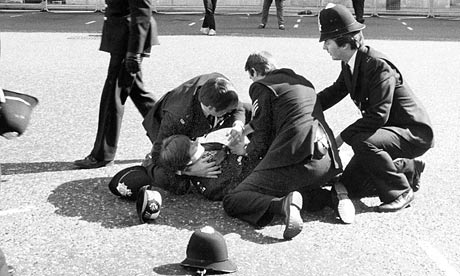
Police officers try to revive PC Yvonne Fletcher after she was shot outside the Libyan embassy in London in 1984 during an anti-Gaddafi protest. Libyan officials say the suspect might not be extradited. Photograph: Mohamed Maklovf / Rex Features
The justice minister of the Libyan rebels' National Transitional Council (NTC) said on Friday a post-Gaddafi government would "not give any Libyan citizen to the west", in an apparent blow to British hopes of putting on trial the suspected killer of Yvonne Fletcher, the police officer shot dead 27 years ago outside the Libyan embassy.
Mohammed al-Alagi also ruled out the return to the UK of Abdelbaset al-Megrahi, the man convicted of the Lockerbie bombing but released in 2009 on compassionate grounds.
"Al-Megrahi has already been judged once and he will not be judged again," he told journalists in Tripoli. "We do not hand over Libyan citizens, [Muammar] Gaddafi does."
Alagi added: "We will not give any Libyan citizen to the west," a comment that appeared to rule out the extradition of the man suspected of shooting Fletcher in 1984.
Earlier on Sunday, the foreign secretary, William Hague, played down suggestions that the NTC would not work with British officials in their the hunt for her killer. He said: "When chairman [Mustafa Abdel] Jalil … was with us in London in May he committed himself and the council to co-operating fully with the British government on this issue."
Hague was responding to a report in the Sunday Times that quoted two NTC officials saying nobody would be sent to the UK to face trial for Fletcher's killing.
"Libya has never extradited or handed over its citizens to a foreign country. We shall continue with this principle," said Hassan al-Sagheer, a member of the NTC.
Another NTC member, Fawzi al-Ali, was quoted as saying: "According to our laws, no one can be handed over unless there are special agreements to do so."
A spokeswoman for the Foreign Office said that, at present, Libyan law prohibits the extradition of its own citizens. It does, however, allow for its nationals to be tried in Libya for crimes committed overseas.
Guma el-Gamaty, the NTC's UK co-ordinator, took part in the anti-Gaddafi protest that Fletcher was policing when she was shot.
Gamaty added that, as with the Fletcher case, the issue of an eventual return to Scottish jail for Megrahi was "a decision for a future Libyan government". The whereabouts of Megrahi, who was given a hero's welcome when he returned to Libya two years ago, are unknown.
Embassy staff were subsequently allowed to leave Britain, but diplomatic ties with Libya were severed.
Those seeking justice for Fletcher, however, were given a boost on Friday when it emerged that the Crown Prosecution Service had heard a witness account that identified a junior diplomat, Abdulmagid Salah Ameri, as the possible gunman.
On Saturday, the international development secretary, Andrew Mitchell, said the emergence of a new suspect would be raised with the NTC. The government would, he said, be pursuing the case "in every way we can".
